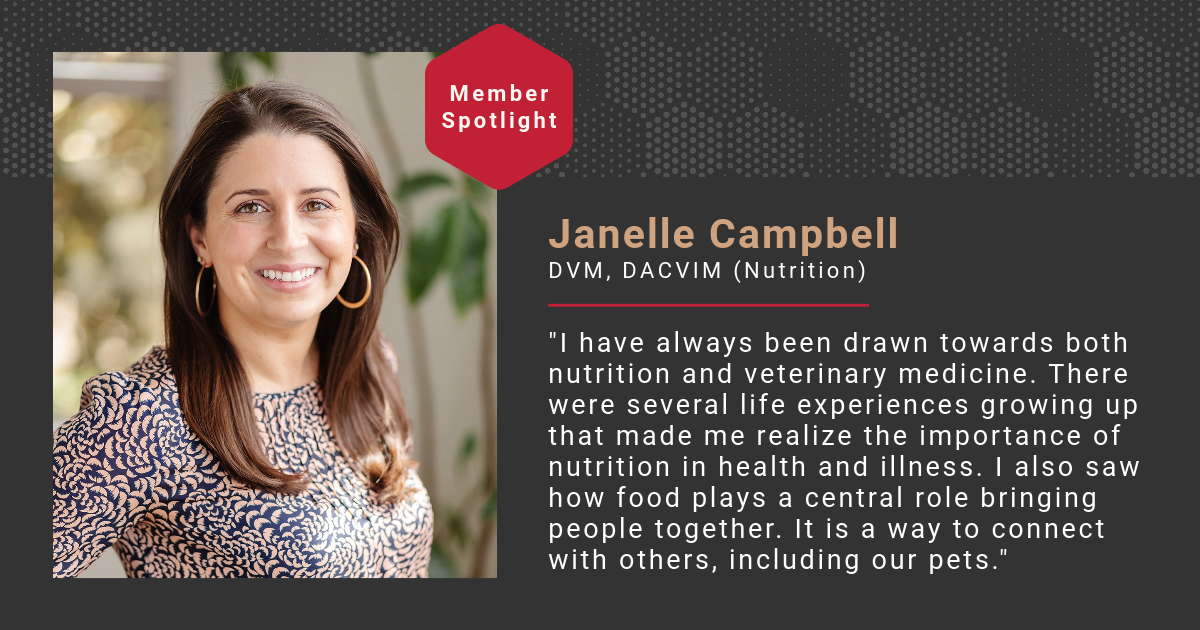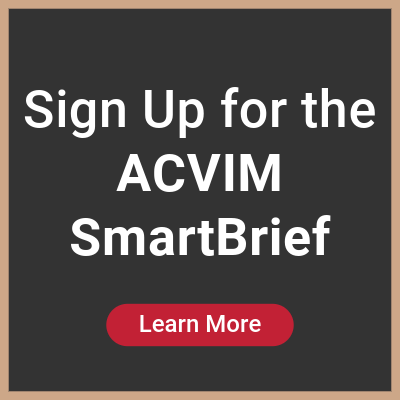Member Spotlight: Janelle Campbell, DVM, DACVIM (Nutrition)

Janelle Campbell, DVM, DACVIM (Nutrition)
A newly boarded Diplomate, Dr. Campbell attended undergrad at the University of California, Davis, where she completed a bachelor's degree in animal science. After obtaining her DVM from Western University of Health Sciences, Dr. Campbell completed a rotating internship in San Diego. She followed her internship with a year as an emergency clinician. She then completed her small animal nutrition residency at the University of Missouri. Dr. Campbell currently resides in Washington state where she works at a specialty hospital.
What inspired you to become a Board-certified veterinary specialist?
I have always been drawn towards both nutrition and veterinary medicine. There were several life experiences growing up that made me realize the importance of nutrition in health and illness. I also saw how food plays a central role bringing people together. It is a way to connect with others, including our pets. My understanding and passion for nutrition further developed during my undergraduate education, and I knew it was something I wanted to pursue further.
Are there any resources or pieces of advice that helped you along the way?
I have always been encouraged by a saying my grandfather would tell me: “If anyone else can do it, so can you.” One of the ways I have interpreted this advice is that obstacles should not stop us from achievement. There are many challenges to become a veterinarian that it can be overwhelming to envision completing a specialty as well. I encourage others to continue pursuing their passions even if it seems daunting.
Is there a story or experience that stands out in your mind that reaffirmed your decision to work in specialty veterinary medicine?
What helped reaffirm my decision the most was spending time with other nutritionists. By experiencing what a day in the life of a clinical nutritionist looked like, I was able to visualize what my future could be. It motivated me even more to pursue my passion.
"My knowledge of nutrition has allowed me to view clinical scenarios with a different perspective. By looking at how nutritional biochemistry works in disease, I can better support patients basic and essential needs. "
With specialty training and clinical experience, we can identify specific knowledge gaps and strive to find answers. Specialists can guide research design to assess and answer these knowledge gaps more accurately.
What does a typical workday look like for you?
A typical workday starts with identifying and addressing hospitalized patients that may need nutritional intervention or support. For any new nutrition consultations, there is a significant amount of prep work. Clients fill out a comprehensive diet history and patient records are thoroughly reviewed to understand and develop an appropriate nutrition plan. Part of a nutrition assessment starts with baseline blood work. However, we may run additional things like a urinalysis, gastrointestinal panel, or nutrient levels such as magnesium or vitamin D to further understand and make recommendations. Abdominal ultrasounds and swallow studies are other diagnostics that a nutritionist may utilize to make a diagnosis and nutrition plan. Nutrition is heavy on communication, so there is a fair amount of time built into my schedule for client communication. There is also dedicated time for formulating diet plans, including home-cooked diet recipes.
One of my most recent career successes is becoming a boarded nutritionist and starting a nutrition service. Nutrition is a relatively new specialty and there is little experience with building the department. Hearing the advice and experience from other nutritionists helped me develop an initial structure. Additionally, the support and guidance from my management team and colleagues has helped address the needs of the hospital.
What do you consider a challenge you’ve faced in your career? How did you overcome it?
The most challenging aspect of starting a nutrition department has been the business considerations. For example, developing payment structure, advertising, inventory, and other business needs. I knew this would be challenging for me given my science background. So, during veterinary school, I was a part of the veterinary business and management association which gave me a foundation for where to start. However, there were still many unknowns and I utilized others with more experience to fill in any gaps.
Arm yourself with information by talking to Diplomates and residents in the field. This will not only help motivate you but help you develop and open pathways to achieve your goal. It is easy to get caught up with a “do it all” mentality. Make sure to always take time for self-care to avoid burn-out.
…
